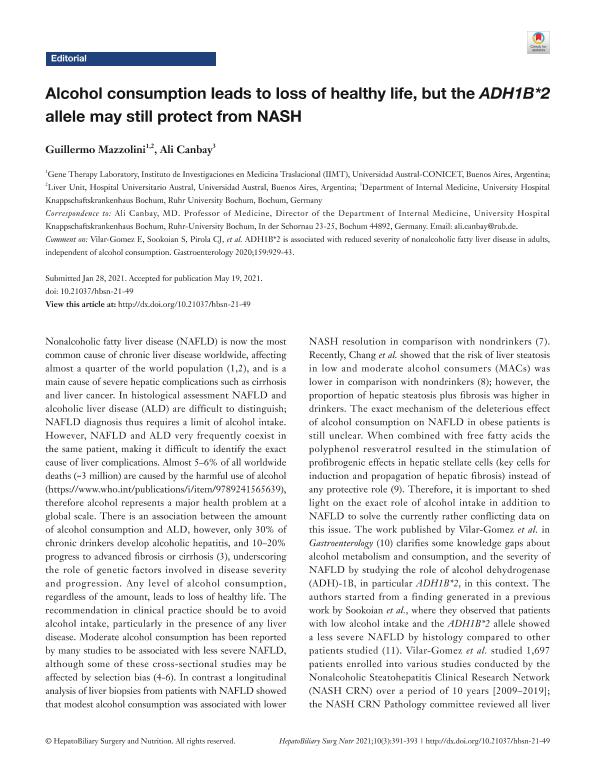Artículo
Alcohol consumption leads to loss of healthy life, but the ADH1B*2 allele may still protect from NASH
Fecha de publicación:
06/2021
Editorial:
AME Publishing Company
Revista:
Hepatobiliary Surgery and Nutrition
ISSN:
2304-3881
e-ISSN:
2304-389X
Idioma:
Inglés
Tipo de recurso:
Artículo publicado
Clasificación temática:
Resumen
Nonalcoholic fatty liver disease (NAFLD) is now the most common cause of chronic liver disease worldwide, affecting almost a quarter of the world population (1,2), and is a main cause of severe hepatic complications such as cirrhosis and liver cancer. In histological assessment NAFLD and alcoholic liver disease (ALD) are difficult to distinguish; NAFLD diagnosis thus requires a limit of alcohol intake. However, NAFLD and ALD very frequently coexist in the same patient, making it difficult to identify the exact cause of liver complications. Almost 5?6% of all worldwide deaths (~3 million) are caused by the harmful use of alcohol (https://www.who.int/publications/i/item/9789241565639), therefore alcohol represents a major health problem at a global scale. There is an association between the amount of alcohol consumption and ALD, however, only 30% of chronic drinkers develop alcoholic hepatitis, and 10?20% progress to advanced fibrosis or cirrhosis (3), underscoring the role of genetic factors involved in disease severity and progression. Any level of alcohol consumption, regardless of the amount, leads to loss of healthy life. The recommendation in clinical practice should be to avoid alcohol intake, particularly in the presence of any liver disease. Moderate alcohol consumption has been reported by many studies to be associated with less severe NAFLD, although some of these cross-sectional studies may be affected by selection bias (4-6). In contrast a longitudinal analysis of liver biopsies from patients with NAFLD showed that modest alcohol consumption was associated with lower NASH resolution in comparison with nondrinkers (7). Recently, Chang et al. showed that the risk of liver steatosis in low and moderate alcohol consumers (MACs) was lower in comparison with nondrinkers (8); however, the proportion of hepatic steatosis plus fibrosis was higher in drinkers. The exact mechanism of the deleterious effect of alcohol consumption on NAFLD in obese patients is still unclear. When combined with free fatty acids the polyphenol resveratrol resulted in the stimulation of profibrogenic effects in hepatic stellate cells (key cells for induction and propagation of hepatic fibrosis) instead of any protective role (9). Therefore, it is important to shed light on the exact role of alcohol intake in addition to NAFLD to solve the currently rather conflicting data on this issue. The work published by Vilar-Gomez et al. in Gastroenterology (10) clarifies some knowledge gaps about alcohol metabolism and consumption, and the severity of NAFLD by studying the role of alcohol dehydrogenase (ADH)-1B, in particular ADH1B*2, in this context. The authors started from a finding generated in a previous work by Sookoian et al., where they observed that patients with low alcohol intake and the ADH1B*2 allele showed a less severe NAFLD by histology compared to other patients studied (11). Vilar-Gomez et al. studied 1,697 patients enrolled into various studies conducted by the Nonalcoholic Steatohepatitis Clinical Research Network (NASH CRN) over a period of 10 years [2009?2019]; the NASH CRN Pathology committee reviewed all liver biopsies, and comprehensive alcohol consumption was obtained by AUDIT and LDH questionnaire, binge and heavy drinkers were excluded (170 patients). Remarkably, the frequency of ADH1B*2 carriage varied across race being high in Asians/Pacific Islanders/Hawaiians (86%) and low in non-Hispanic whites (8%), Hispanics (14%), and Blacks (4%), but the study was focused on the 1,153 non-Hispanic whites, which were mainly female, obese, and hypertensive. Among the 1,153 patients, 30% had advanced fibrosis, and 60% had definite NASH. The cohort included 720 non-drinkers and 433 moderate drinkers, but no heavy alcohol consumers. ADH1B*2 carriers were more likely to be male, and moderate alcohol consumption was similar between ADH1B*1 and ADH1B*2 carriers
Archivos asociados
Licencia
Identificadores
Colecciones
Articulos(IIMT)
Articulos de INSTITUTO DE INVESTIGACIONES EN MEDICINA TRASLACIONAL
Articulos de INSTITUTO DE INVESTIGACIONES EN MEDICINA TRASLACIONAL
Citación
Mazzolini Rizzo, Guillermo Daniel; Canbay, Ali; Alcohol consumption leads to loss of healthy life, but the ADH1B*2 allele may still protect from NASH; AME Publishing Company; Hepatobiliary Surgery and Nutrition; 10; 3; 6-2021; 391-393
Compartir
Altmétricas




